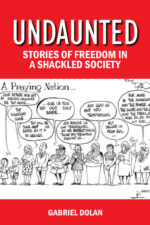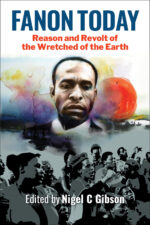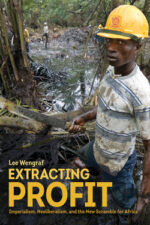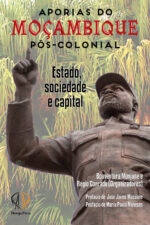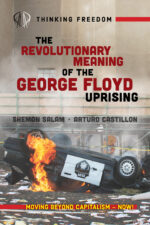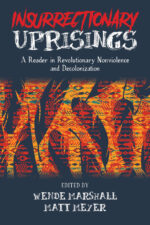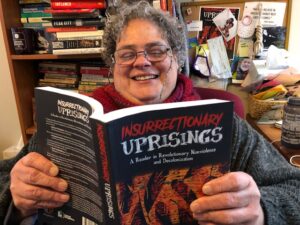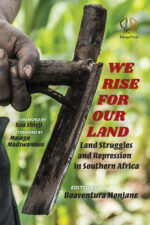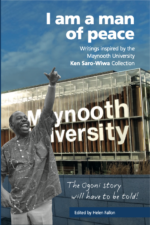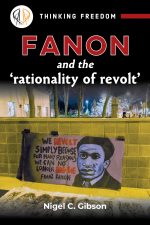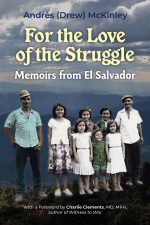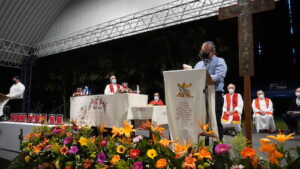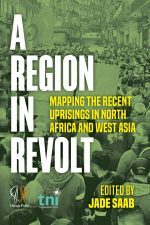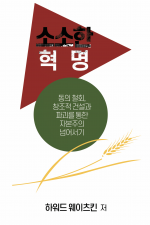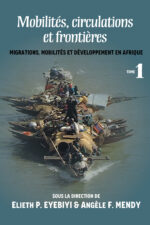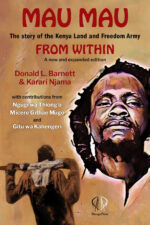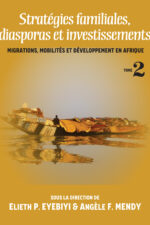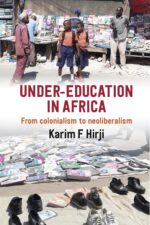-
Undaunted: Stories of Freedom in a Shackled Society
USD $ 20.00….to free oneself or assist in liberating others involves taking risks, being suspicious of the status quo, leaving the safety of the shore and launching out into the deep and the unknown. This is a very lonely calling too as one immerses oneself into the whole of reality with courage to confront and listen. Yet, the calling is not to be the liberator of the oppressed but to make a commitment to fight alongside them, as Paulo Freire wrote in Pedagogy of the Oppressed. — Fr Gabriel Dolan
From his work in Turkana, Kitale, Kapenguria and Mombasa, Father Gabriel reminds us that true transformative change comes from the people themselves, from the bottom up. This is a challenge that the social justice/human rights practitioners must internalize and the sooner the better. The idea of being the “voice of the voiceless” must transform to facilitating, encouraging and giving space to those who suffer the indignities of injustice, violence, poverty and repression. Indeed, one of the most significant tasks for the human rights community is to devolve away from Nairobi, in real, practical, and substantive ways.
It is not easy for a white man, with all the attendant privileges that brings, to become an integral part of the struggle for pro-poor transformative change in Kenya, and be subject to arrest, harassment, and repression. For those who read these memoirs, please circulate them to everyone you know. Translate them, read them in the mosques, churches and under trees so that Kenyans can get a sense of where we have come from, what we should avoid, and what it takes to make some gains that benefit the majority of our people. — Maina Kiai
This book is published by Zand Graphics Ltd (Kenya) in association with Daraja Press.
-
The Revolutionary Meaning of the George Floyd Uprising
There was nothing but darkness in the spring of 2020 as the Covid-19 pandemic raged and shut down the economy. But as right-wing protesters demanded an end to the lockdown, a much bigger social conflict was brewing under the surface. A rebellion exploded in Minneapolis in response to the brutal police murder of George Floyd in late May, during which a police station was overtaken and burned down. The uprising quickly spread across the United States as protesters looted downtown urban centers, set fire to cop cars, vandalized government buildings, and fought the police. The Black proletariat led the charge, but white, Latinx, Asian, and Indigenous proletarians also joined the fight, demonstrating new possibilities for building alliances. While anti-police rebellions continued throughout the summer and fall, the uprising receded with the start of the winter. But this conflict is far from over.
In an effort to think through the experience of the uprising and prepare for the great struggles that are coming, The Revolutionary Meaning of the George Floyd Uprising provides an in-depth analysis of what exactly happened during the 2020 uprising, its potentials, internal limits, and strategic implications.
-
Struggling to be seen: The travails of Palestinian cinema
The book explores the challenges Palestinian filmmakers confront to develop a cinema that gives expression to the national narrative. It is based on collaborative research involving Film Lab Palestine, Sheffield Palestine Cultural Exchange and Sheffield Hallam University. We explore the political, economic and cultural contexts that impact on Palestinian film production and some of the barriers encountered in profiling and screening Palestinian films, to shed light on the complex terrain that is traversed to sustain and develop a film industry and film culture in historic Palestine and beyond.
Table of contents
Image credits
Introduction
The struggle to develop a national cinema
The experience of Filmlab Palestine
Visualising the Palestinian past
Roadblocks, borders and hostile environments
The screening and reception of Palestinian films
The Palestinian short film
Conclusion
Filmography
Appendix 1: Cinema of the Palestinian Revolution
Appendix 2: 70 Years of Nakba: Audience response
Appendix 3: Love and Desire in Palestine: Audience response
Appendix 4: Selection of leaflets from film screenings
About the authorsPraise for Struggling to be seen
To so nimbly and elegantly traverse Palestinian time and space is itself a defiance of the occupation’s brutally enforced barriers. The authors’ unstintingly political examination of Palestinian cinema has much to offer both those in the know and readers new to this extraordinary body of work. — Kay Dickinson, Professor, Film Studies, Concordia University
Working extensively through primary sources, conducting research and interviews across generations of Palestinian filmmakers, the authors offer the reader an ambitious and wide-ranging essay which charts the development of a national Palestinian cinema, from an historical and critical perspective. By exploring the constellation of political, social and aesthetic concerns that shape this cinema, this authors challenge us to rethink the stakes behind the contemporary development of a Palestinian cinema industry, its audience reception, in historic Palestine and beyond.— Samia Labidi, cultural programmer & artistic curator
Illuminating and compelling, Struggling to be Seen lays bare the historical, enduring but also emerging (colonial and neocolonial) obstacles to the development of a film industry and film culture within the West Bank and Gaza. Though familiarly sobering (in its re-confirmation of the scale of injustice facing Palestinians), the book provides up-to-the-moment and an interdisciplinary account that provides rich, fresh terrain that reveals new and exciting progressions within Palestinian film culture. —Michele Aaron, Reader in Film and Television, University of Warwick, author of Death and the Moving Image: Ideology, Iconography and I (Edinburgh Univer- sity Press, 2014) Director, Screening Rights Film Festival.
Struggling to be Seen is a must read for those who are interested in under- standing the multilayered challenges that face Palestinian cinematography from its production phase to its screening phase. The book is a short read which takes the readers through the different stages which shaped the Palestinian film making enterprise. Struggling to be Seen shows the restrictions that Palestinian filmmakers face from the initial stages to funding and screening. The authors tell a story of a people whose sense of self-reflection is suppressed by the Israeli oppressive machine which con- stantly works at erasing the Palestinian peoplehood, detaching it from its past.— Nahed Habiballah, Assistant Professor and member of the Board of Directors of Policy and Conflict Resolution Studies Center, Arab American University, Ramallah, Palestine
-
I am a man of peace: Writings inspired by the Maynooth University Ken Saro-Wiwa Collection
This book marks the 25th anniversary of the execution of Nigerian activist and written Ken Saro-Wiwa. The 21 essays, by international contributors, and 42 poems by new and established poets, are inspired by his ideals and activism.
The volume includes contributions by people intimately connected with Saro-Wiwa. His brother Dr Owens Wiwa recounts how his older brother awakened and nurtured his awareness of the tremendous damage Royal Dutch Shell was doing to their homeland, in collaboration with the then Nigerian military government. His firsthand account of the brutality of the military government and its impact; his unsuccessful efforts to save the life of his brother; his time in hiding and subsequent escape, with his family, from Nigeria and his efforts to retrieve the remains of his brother for burial, makes for very moving reading. Likewise, Noo Saro-Wiwa shares her story of growing up in England with strong links to family in Nigeria, and the trauma of hearing of her father’s execution while at University.
Maynooth University, where the editor works as Deputy Librarian, holds the death row correspondence from Ken Saro-Wiwa to Sister Majella McCarron. McCarron provides two personal essays. One, a reflection on the events that shaped her work with Saro-Wiwa in Nigeria and her subsequent efforts to save the lives of the Ogoni 9: the second essay explores her experience as a table observer of the Shell to Sea campaign, which strove to have gas, discovered off the west coast of Ireland, refined at sea rather than inland.
The damage that Shell has caused in Ogoni and the issue of redress are topics addressed in essays by experts including Mark Dummett, of Amnesty International, who investigated how Shell and other oil companies have caused or contributed to human rights abuses through their operations in the Niger Delta. Daniel Leader, a barrister and partner at Leigh Day’s international law department, the firm who have led a number of ground breaking human rights cases, including a series of cases against Shell on behalf of Nigerian communities, explores the issue of legal redress. Architect, environmental activist, author and poet Nnimmo Bassesy’s wide ranging essay presents Saro-Wiwa as activist and writer and creator of the Ogoni Bill of Rights, against the backdrop of the UNEP report of the Environmental Assessment of Ogoniland, which recorded that drinking water in Ogoni had benzene, a carcinogen, at over 900 times the level permitted
I welcome the publication of this volume which highlights the work of Trócaire and other people and organisations
to fight for a more just world. Trócaire campaigned strongly for the release of the Ogoni 9 and continues to campaign for justice in the face of state and corporate violations of human rights. The writings of Ken Saro-Wiwa and those inspired by his work keep the flame of justice lit.Dr Caoimhe De Barra, Chief Executive Officer, Trócaire.
The publication of I am a Man of Peace: Writings Inspired by the Maynooth University Ken Saro-Wiwa Collection highlights the shift towards peaceful protests as a means to a more sustainable end. It is a justification that one’s dreams for the greater good can still be attained without bloodshed. Ken preached, lived, and practiced peace in his search for justice even in the face of stiff opposition. Years after his death, Ken’s ideologies and philosophies have proved relevant today.
Dr Owens Wiwa, Executive Vice-President, Clinton Health Access Initiative (CHAI).
Sister Majella McCarron’s choice of Maynooth University for this unique donation was particularly appropriate, given the University’s long involvement with issues of inclusion and justice in Ireland and abroad. This deep-rooted commitment is today articulated in our University Strategic Plan, where a strategic goal is ‘to build on our achievements to date and become a model University for equality, diversity, inclusion and inter-culturalism, where social justice, addressing inequality and empowering people are central to our mission.’ This book makes a significant contribution to that goal.
Dr. Gemma Irvine, Vice-President of Equality & Diversity, Maynooth University.
Writing can urge us to pause, to think, and to discover what we really want to say. Sharing that writing calls for courage and support. In this publication, as Jessica Traynor suggests, we see the evidence of a new generation of Irish and new Irish citizens engaging with complex issues through poetry. Reading their poems, we may begin to understand more about each other and ourselves. By bringing together these Irish and new Irish voices the book contributes to building a shared discourse which is essential for trust, community and hope.
Dr Alison Farrell, Founder of the Summer Writing Institute For Teachers (SWIFT) and Co-founder Irish Network for the Enhancement of Writing (INEW)
-
Fanon and the rationality of revolt
We inhabit extraordinary times: times in which we are acutely aware of the intensity of what revolutionary thinker Frantz Fanon called “the glare of history’s floodlights.” The velocity and scale at which the revolt against police murder that began in Minnesota after the death of George Floyd on May 25th and moved throughout the US, and then other parts of the world, was astonishing. It was impossible to predict, but then, in retrospect, it is George Floyd’s death becomes a nodal point: calling for action as well as rethinking and self-clarification. Thinking about this moment with the world revolutionary Frantz Fanon, we need to be aware of continuities and discontinuities — or, as he puts it, opacities — between the ages, his and ours. Fanon is always speaking to us, but often in ways we cannot hear. We have to work to listen to him and to understand the new contexts and meanings in relative opacity. It is this constant dialogue that helps illuminate the present and enable ongoing fidelity to Fanon’s call in the conclusion of The Wretched of the Earth the necessity to work out new concepts to confront one of Fanon’s greatest concerns, the betrayal of the revolutionary movement. In this pamphlet we consider how Fanon’s idea of liberation is connected with “the rationality of revolt.” The practice of engaging Fanon not only with revolt but with the reason or rationality of revolt connects with Fanon’s idea of how this liberated humanity is a product of a new consciousness of collectivity open to rethink everything.
-
소소한 혁명
Suggested Price: USD $ 4.99어떻게 자본주의를 넘어설 것인가라는 질문에 대한 답을, 지금 우리가 “감히” 찾아보려고 한다. 이 소책자를 통해, 자본주의를 벗어나 생태사회주의로 향하는 길을 찾는 우리의 노력이 뚜렷해지길 바란다.
자본주의에 갇힌 우리는, 어떤 형태로든 행동 또는 비행동inaction에 관여하고 있다. 행동은, 자본주의를 직접 마주하기 보다는 자본주의가 초래하는 심각한 여러 문제를 개선하기 위한 투쟁에 참여하는 모습을 띈다. 즉, 우리의 행동은 원인이 아니라 결과에 초점을 맞추는 모순을 보인다.
반면, 비행동은 동의를 의미하게 된다. 우리는 자본주의 경제 체계를 영속시키는 경제 활동에 문제 제기를 하거나 변화를 요구하는 행동을 하지 않음으로써 자본주의에 [암묵적으로] 동의하고 있다. 결과적으로 평범한 우리가 자본주의에 봉사하는 자본가 역할을 계속하고 있는 것이다.
왜 자본주의 억압의 대상인 우리가 억압에 동의하는가? 그 이유가 단지 [외부의] 탄압 때문만은 아니라고, 이탈리아 파시즘 하의 감옥에서 그람시Antonio Gramci는 말했다. 즉, “헤게모니”를 장악하는 이념이 우리의 삶을 둘러싼 억압적인 환경을 설명하고 정당화하는 것이다.
“소소한 혁명”은, 개개인의 삶 속에서, 쉽고 안전하게, 엄청 근사하지는 않지만 일상적이고 실천가능한 행동과 비행동을 얘기한다. 지금까지의 혁명사는, 혁명을 가능하게 했던 전체 민중보다는 소수의 혁명가에 주목했었지만, 자본주의에 맞서는 “우리는” 마르크스나 엥겔스가 떠올렸던 주인공들보다 훨씬 다양하고 규모가 커졌다. 자본주의를 수호하기 위해 싸우는 “그들은” 전 세계 인구의 극소수일 뿐이다.
자본주의의 어떤 특징이 억압적이고 그래서 제거되어야 하는지, 또 반대로 어떤 사회경제구조의 특징이 억압적이지 않으며 그래서 남겨져야 하는지를 뚜렷이 설명하는 전략이 필요하다. 자본주의 이후 사회가 어떤 모습이어야 할지는 점점 명확해지고 있다. 소소한 혁명은, 자본주의의 영속과 발전에 필수적인 과정에 대한 우리의 동의를 거두는 데에서 시작하여, 수 백 만의 우리가, 여전히 적은 소수이긴 하지만, 건설적인 혹은 파괴적인 노력에 창의적으로 참여할 수 있는 방법 또한 포함한다.
세상은 자본주의 그 이후로 이미 진행 중이다. 세계 곳곳에서 창의적인 모습의 공동체communal organization들이 생겨나 스스로 통치하고 구성원들의 생존과 안녕을 보장하기 위해 활동하고 있다. 복지 국가를 포함한 자본주의 국가를 넘어서는 것은 국가 자체를 넘어서는 결과로 이어진다. 연대 경제solidarity economy는 먼저, 소규모의 협동조합 성격을 띄는, 저렴하고 유쾌하고 편안한 주거 공간을 구성하는 방법을 모색하여, 착취적인 임대료, 빚, 세금, 보험에 대한 공동의 해결책을 제시한다. 또한 이러한 공동체는, 영양이 풍부한 먹거리를 지역에서 생산하여 유통하는 방법으로, 자본주의식 농업으로부터 독립을 꾀할 수 있다.
창조적 파괴는, 허가를 받아 하는 대규모의 시위가 아니라 자본주의가 순조롭게 기능할 수 없게 멈추거나 둔화시키는 직접 행동으로 가능하게 된다. 우리가 투자나 세금으로 흘러가게 내버려 두는 돈의 흐름을 비자본주의적인 연대경제에 돌리는 것도 창조적 파괴의 한 방법이다.
소소한 혁명은, 간단하고 안전하며, 자신의 삶을 조금이라도 바꾸고 싶은 의지가 있는 사람이라면 실천가능하다. 자본주의가 우리의 안녕과 행복을 파괴하는 체계라는 것을 알면서도, 부지불식간에 자본주의를 지지하고 동의하는 행동을 멈추는 즐거움을 누릴 수 있다. 놀랍게도 혁명을 위해 다치거나 죽지 않아도 되고, 심지어 큰 불편을 감수하지 않아도 된다. 우리가 해야 할 일은 단 하나. 어차피 하기 싫었던 여러 일들을 이제 정말 그만두는 것이다.
-
Mau Mau From Within: The Story of the Kenya Land and Freedom Army
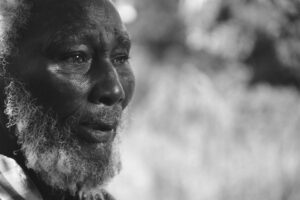
Karari Njama: Photo by Geoffrey Mwangi curated by Kairu Kuguru. The inside story of the struggles of the Kenya Land and Freedom Army, referred to by British colonialism as the ‘Mau Mau rebellion’, is little known today. The autobiographical material written by Karari Njama (a senior leader in the Mau Mau hierarchy) and compiled by Donald L. Barnett was first published by Monthly Review Press in 1966, as Mau Mau From Within: An analysis of Kenya’s Peasant Revolt. It was reprinted in 1970; it has remained out of print for many years. As the late Basil Davidson put it in his review of the first edition: “Njama writes of the forest leaders’ efforts to overcome dissension, to evolve effective tactics, to keep discipline, mete out justice … and to teach men how to survive in those merciless forests. His narrative is crowded with excitement. Those who know much of Africa and those who know little will alike find it compulsive reading. Some 10,000 Africans died fighting in those years . Here, in the harsh detail of everyday experience, are the reasons why.”
The book is an extraordinary story of courage, passion, heroism, combined with recounting of colonial terror, brutality and betrayal. It is a story of how the very idea of being ‘Kenyan’ was intimately linked to the idea of freedom, a connection that was destroyed not only by the firepower of the British, but also by those who collaborated and established themselves as the beneficiaries of neocolonial rule. Disconnecting notions of freedom from identity left only a caricature that rapidly descended into tribalism and ethnicity.
This momentous story of the struggle for freedom described here is relevant not only for a new generation of Kenyans but also for all those engaged in emancipatory struggles internationally. For so long as the experiences arising from the struggles described in this book are perceived as merely ‘African’ or ‘Kenyan’, it is not possible to fully grasp the contributions they have made to the struggle for a universalist humanity.
What is recounted in this publication is more than an ‘analysis of a peasant revolt’. It is above all a history of the Kenya Land and Freedom Army. As Ngūgī wa Thiong’o points out in his Preface to this new edition, ‘we don’t have to use the vocabulary of the colonial to describe our struggles.’ We were tempted to rename the book ‘Kenya Land and Freedom Army from Within.’ But because the original title has wide recognition, and and as one of the characteristics of movements of the oppressed is to appropriate derogatory terms used by their oppressors and repurpose them as an expression of pride in their own experiences, this book retains the original title, but with a change in the subtitle as ‘The Story of the Kenya Land and Freedom Army.’
We were delighted that Karari Njama was able to provide us with a Prologue to the new edition (Kamoji Wachiira, a former political prisoner, connected us with Karari and translated the text of the Prologue). Shujaa Hon Dr Gitu wa Kahengeri, Secretary-General of the Mau Mau War Veterans Association reminds us how the veterans of the liberation movement, like Karari Njama, continue to live in extreme poverty today despite the enormous contribution that they made to the struggle for freedom.
Kenya’s leading writer and academic, Ngūgī wa Thiong’o, points out in the Preface, how so much of the narratives about the Kenya Land and Freedom Army has been written from ‘without’, emphasizing the importance of a book that speaks to the personal testimony from within the movement. We are honoured to have Mīcere Gīthae Mugo, Emerita Professor of Literature at Syracuse University, provide reflections on the importance of the republication of this historical text. There are many who, as children, lived through the terrifying events of the Emergency during which so many were tortured and killed by the British (and their local collaborators) and whose psyche remains deeply affected by what they witnessed. Kamoji Wachiira describes some of these experiences vividly in his Introduction to the new edition. He highlights the extent of betrayal by successive post-independence governments, and the development of the post-independence revival of resistance which he was a central part of. He also emphasizes the importance for a new generation of Kenyans “to gain not only a deep understanding of Kenya’s revolutionary history but also to reflect on what lessons may be drawn for the struggle to achieve real freedom.”
The original publication had no biographical information about Don Barnett. Few are aware of the extent of Don’s political engagement with the cause of liberation, of which Mau Mau From Within was only one aspect. He was a founder of the Liberation Support Movement in Canada, and had close contact with the MPLA (Popular Movement for the Liberation of Angola). Don sadly joined the ancestors in 1975. We are fortunate, however, that Don and Daphne’s son and daughter, Michael Barnett and Dawn Barnett, were able to provide, together with Ole Gjerstad, a revealing biography.
We have endeavoured to retain the content of the original book (but for a few minor corrections) including the original Selected Bibliography. An updated Further Reading list is provided.
-
Love after Babel and other poems
ANNOUNCEMENT: Love After Babel wins Nicolás Cristóbal Guillén Batista Outstanding Book Award by the Caribbean Philosophical Association
Congratulations to Chandramohan S!
Love after Babel is a collection of poems that deal with themes such as caste, the resistance of Dalit people, Dalit literature, islamophobia and other political themes, with almost one hundred poems divided into three sections (Call Me Ishmail Tonight; Name Me a Word; Love after Babel). The introduction is by Suraj Yengde (award-winning scholar and activist from India, author of the bestseller Caste Matters, inaugural postdoctoral fellow at the Initiative for Institutional Anti-racism and Accountability, Shorenstein Center on Media, Politics and Public Policy at the Harvard Kennedy School).
Chandramohan’s poems are dialogues of the ‘ self’ with the ‘other’. He brings to life a world that subverts myths, literary canons, gender and caste stereotypes by pooling in sparklingly new metaphors with sensitivity and care. He draws his images from contemporary incidents as well as myths and legends of yore, and delves deep into the politicized realm, thus ‘rupturing the hymen of demarcations’ of identity, resistance, repression and love.
—Babitha Marina Justin, poet, artist and academician
Chandramohan’s poetry is an extraordinary combination of a strong individual voice, crying out against a deeply felt sense of personal abuse, and a sophisticated understanding of the long history and mythology of such abuse, in India but also in the world at large. Mythological figures like Shambuka and Urmila illluminate, and are illuminated by, modern atrocities. The poems are by turns shocking, moving, and exhilarating. —Wendy Doniger O’Flaherty is an American Indologist whose professional career has spanned five decades.
Chandramohan S has the stark ability as a poet to react to any social happening, and these turn out to be in the most responses to societal happenings, plunged into the dark interiors of human behavior. So these could be related to caste oppression. Economic exploitation, religious polemics etc. But the poetic ability or the agility is always there to handle a situation born out of politico- social situations. There lies his remarkable dexterity as a poet commentator. His lines are direct, and even angry. But that does not matter. This is poetry- at its best. No wonder then that, his poems have been published world wide. He is perhaps now one of the very few, if not the only Indian poet in English to have taken the burden of social and political repression, as a distinct and livid political idiom. To read his poems is also painful, but the poetry is in the pain!—Ananya S Guha lives in Shillong in North East India. He has been writing and publishing his poetry for the last 33 years.
Love after Babel selected by as one of Twelve books that form part of the arsenal of Dalit writing by Suraj Yangde. surajyengde@surajyengde
surajyengde@surajyengdeHad an honor to introduce this extremely riveting collection of humanity-filled radical lines “Love After Babel” told by the incomparable art form—Dalit Poetry. Chandramohan is confidently flirtatious with his words. by

